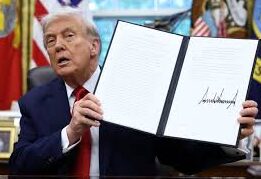The U.S. government said Tuesday that the economy likely created 911,000 fewer jobs in the 12 months through March, a sharp slowdown that started even before President Donald Trump’s import tariffs took effect.
Economists had predicted the Labour Department’s Bureau of Labour Statistics (BLS) would revise its data down by 400,000 to 1 million jobs for the period from April 2024 to March 2025. The preliminary estimate shows employment through March 2024 was cut by 598,000 jobs.
This revision is part of the BLS’s annual “benchmark” update, which compares monthly payroll survey results with a more complete dataset from unemployment insurance tax records and the Quarterly Census of Employment and Wages (QCEW). A final revision will be released in February alongside the January jobs report. That update will also adjust monthly payroll figures before and after March.
The announcement comes after recent reports showed job growth nearly stalled in August and the economy shed jobs in June for the first time in four and a half years.
Beyond trade policy uncertainty, the labor market has also been pressured by the White House’s immigration crackdown, which reduced labor supply. At the same time, businesses are investing more in automation and artificial intelligence, slowing demand for workers.
Most economists say the revisions won’t change monetary policy much. The Federal Reserve is still expected to cut interest rates next Wednesday, after pausing in January because of uncertainty over tariffs.
Data Integrity Questioned
The monthly jobs report comes from the Current Employment Statistics survey, which covers about 121,000 businesses and government agencies representing 631,000 worksites. By contrast, the QCEW draws from state unemployment insurance filings and accounts for about 95 percent of total U.S. employment.
The sharp cuts to May and June job numbers a combined 258,000 fewer positions angered Trump. He fired BLS Commissioner Erica Engross McEntarfer, accusing her without evidence of falsifying data. He has nominated economist E.J. Anton to replace her.
Antoni, who has written opinion pieces attacking the BLS and even suggested suspending the monthly jobs report, is widely seen by economists as politically motivated and unqualified.
The National Association for Business Economics urged policymakers, business leaders, and academics to back the BLS, saying U.S. statistics must remain “accurate, independent, and reliable” worldwide.
Economists say part of the discrepancy comes from the agency’s “birth-death model,” which estimates job gains or losses from new business openings or closures that are not yet captured in surveys.






